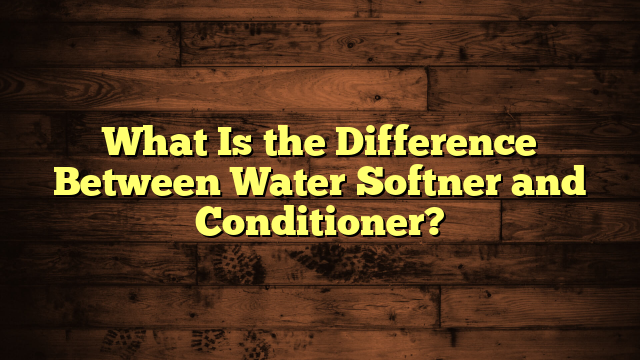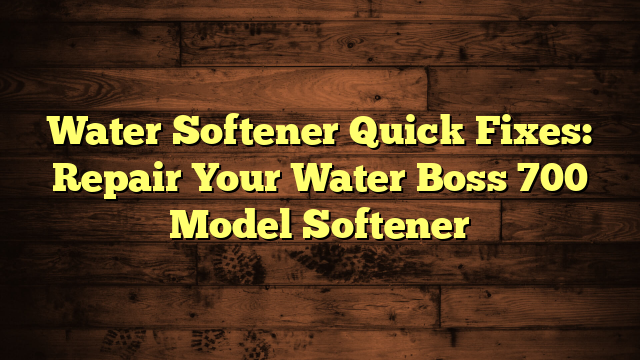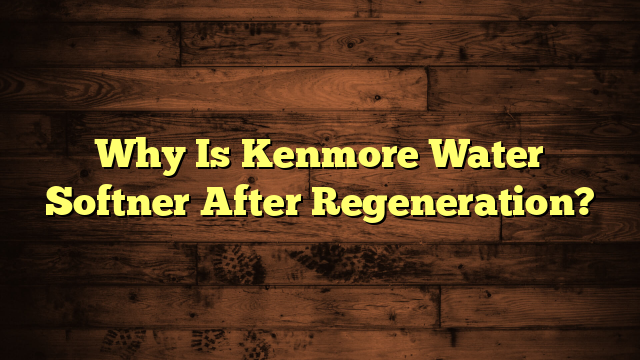What Is the Difference Between Water Softner and Conditioner?
You might not realize that the terms "water softener" and "water conditioner" describe two distinct approaches to managing hard water. While they both aim to improve water quality, their methods and effectiveness can vary considerably. Understanding these differences is essential for making an informed choice that suits your household needs. So, how do these systems actually work, and which one might be more beneficial for you? Let's explore the key distinctions and what they mean for your water use.
Key Takeaways
- Water softeners remove hard minerals like calcium and magnesium, while conditioners alter mineral properties to prevent scale formation without removal.
- Softeners use ion exchange and salt-based systems, whereas conditioners employ electromagnetic or catalytic processes.
- Maintenance for softeners involves regular salt replenishment, while conditioners require minimal upkeep and periodic monitoring.
- Softeners can save on appliance repairs due to improved efficiency, but conditioners often have lower upfront costs and are more eco-friendly.
- Conditioners maintain mineral content and provide a gentler approach, but may not effectively remove hard minerals compared to softeners.
Understanding Hard Water
Hard water is characterized by a high concentration of dissolved minerals, particularly calcium and magnesium. You might encounter hard water sources such as groundwater, which can absorb minerals from the surrounding soil and rock formations.
Moreover, surface water can also become hard if it passes over mineral-rich areas.
The effects of hard water can be quite noticeable in your home. For instance, you might find that soap doesn't lather as well, leading to excessive soap use and potential skin irritation.
You'll likely notice unsightly mineral deposits on fixtures, appliances, and dishes, which can require frequent cleaning. In addition, hard water can cause scale buildup in plumbing systems and water heaters, reducing their efficiency and lifespan.
If you're experiencing these issues, it's crucial to assess your water quality. Testing kits are available to help you determine hardness levels, enabling you to make informed decisions about potential solutions.
Understanding hard water sources and their effects can guide you in managing any challenges you face, ultimately leading to a more efficient and comfortable living environment.
What Is a Water Softener?
A water softener is a system designed to reduce the hardness of water by removing minerals like calcium and magnesium. These minerals contribute to water hardness, which can lead to various issues such as scale buildup in pipes and reduced efficiency of appliances. By addressing this problem, a water softener provides you with softer water, improving both the effectiveness of soaps and detergents and the longevity of your plumbing system.
Here's a quick comparison of key aspects related to water softeners:
| Aspect | Description |
|---|---|
| Purpose | Reduce water hardness |
| Minerals Removed | Calcium, Magnesium |
| Common Systems | Ion exchange, salt-based systems |
| Benefits | Improved lathering, appliance efficiency |
| Maintenance | Regular salt replenishment needed |
Utilizing a water softener enhances your water quality and protects your home's plumbing infrastructure. By investing in mineral removal, you not only enjoy cleaner dishes and longer-lasting appliances but also improve your overall water experience. Understanding these benefits can help you decide whether a water softener is right for your household needs.
How Water Softeners Work
When you understand how water softeners work, you can appreciate their effectiveness in transforming hard water into a more manageable resource.
Water hardness is primarily caused by high concentrations of calcium and magnesium ions, which can lead to mineral buildup in your plumbing and appliances. A water softener uses a process called ion exchange to combat this issue.
In the ion exchange process, hard water flows through a resin tank filled with small beads coated with sodium ions. As the hard water passes through, the calcium and magnesium ions attach to the beads, displacing the sodium ions. This exchange effectively removes the hardness from the water.
The now softened water can flow into your home, reducing the risk of mineral buildup in pipes, fixtures, and appliances.
Eventually, the resin beads become saturated with calcium and magnesium ions, necessitating regeneration. During this process, a brine solution is flushed through the resin tank, replenishing the sodium ions and flushing out the accumulated hardness minerals.
This cycle guarantees that your water softener continues to provide you with soft water, minimizing the negative impacts of hard water on your home.
What Is a Water Conditioner?
Water conditioners, often referred to as descalers, provide an alternative approach to managing hard water without removing minerals like calcium and magnesium.
Instead of softening water, these devices alter the properties of the minerals present, preventing them from forming scale on pipes and appliances. This helps maintain water quality and prolongs the lifespan of your plumbing system.
You'll find that water conditioners typically use various methods, such as electromagnetic or catalytic processes, to influence the behavior of minerals in the water.
By doing this, they reduce the potential for limescale buildup on surfaces, which can lead to costly repairs and decreased efficiency in water heaters, dishwashers, and other appliances.
For ideal performance, it's important to follow certain maintenance tips.
Regularly check the system for any signs of wear or malfunction, and verify that the device is properly calibrated.
Furthermore, monitor your water quality periodically to assess the effectiveness of the conditioner.
How Water Conditioners Work
Many homeowners are curious about how water conditioners function to tackle hard water issues. Water conditioners primarily focus on water treatment processes that modify the properties of hard water without removing the minerals. Instead of eliminating calcium and magnesium, these systems alter the behavior of these minerals, reducing their ability to form scale and soap scum.
The most common technology used in water conditioners involves a process called template-assisted crystallization (TAC). In this method, water flows through a medium that promotes the formation of stable mineral particles. These particles remain suspended in the water rather than adhering to surfaces, which reduces scaling in pipes and appliances.
Another method is the use of electronic or magnetic devices. These devices generate a magnetic or electric field that influences the mineral structure in the water, preventing it from forming scale.
Key Differences Explained
When comparing water softeners and conditioners, it's crucial to understand their distinct purposes and treatment methods.
Each system affects water quality differently, which can impact your home and appliances.
Purpose of Each System
Understanding the purpose of water softeners and conditioners is essential for addressing hard water issues effectively. While both systems serve to improve water quality, they operate differently and target distinct problems.
Water softeners primarily focus on removing hardness minerals like calcium and magnesium from your water. By doing this, they prevent scale buildup in plumbing and appliances, which can lead to costly repairs. Common softener types include ion-exchange systems and salt-free water softeners, each with unique methods of tackling hard water.
On the other hand, water conditioners don't remove hardness minerals. Instead, they alter the structure of these minerals, helping to prevent scale formation without eliminating the minerals themselves. This method can provide several conditioner benefits, such as enhancing the lifespan of appliances and reducing soap usage.
Here's a quick comparison to illustrate the differences:
| Feature | Water Softener | Water Conditioner |
|---|---|---|
| Removes Hardness Minerals | Yes | No |
| Prevents Scale | Yes | Yes |
| Common Types | Ion-exchange, Salt-free | Template-assisted, Magnetic |
| Maintenance | Regular salt replenishment needed | Minimal maintenance required |
| Cost Efficiency | Can save money on repairs | Lower upfront cost |
Treatment Methods Explained
The treatment methods employed by water softeners and conditioners highlight their key differences in addressing hard water issues.
Water softeners typically use chemical treatments, specifically ion exchange, to remove calcium and magnesium ions from the water. During this process, these hard minerals are replaced with sodium ions, effectively softening the water. This method requires a brine tank and regular replenishment of salt, which adds to the installation differences you'll need to take into account.
On the other hand, water conditioners often utilize physical methods, such as template-assisted crystallization or magnetic fields, to alter the structure of hardness minerals. These methods don't remove the minerals but change their form, preventing them from causing scale buildup.
Installation of a conditioner is usually simpler, as it often doesn't require a drain or brine tank.
Understanding these treatment methods can help you choose the right system for your needs. If you want to eliminate hardness through chemical treatments, a water softener is your best option. However, if you prefer a maintenance-free solution that modifies the behavior of minerals, a water conditioner may suit you better.
Effects on Water Quality
Choosing between a water softener and a conditioner greatly impacts water quality.
Water softeners primarily target mineral content, specifically calcium and magnesium ions, effectively removing them from your water. This process prevents scale buildup in pipes and appliances, enhancing their longevity and efficiency. As a result, you'll notice improved lathering of soaps and detergents, leading to cleaner dishes and softer skin.
On the other hand, water conditioners don't remove these minerals. Instead, they modify how they interact with surfaces and your plumbing system. By using techniques like template-assisted crystallization, conditioners prevent mineral deposits from adhering to surfaces. This can lead to a more stable water quality without the complete removal of beneficial minerals.
Ultimately, your choice will depend on your specific water quality needs. If you're facing hard water issues that lead to scaling, a softener is more effective. If you prefer to maintain mineral content while reducing scaling potential, a conditioner is the right option.
Understanding these differences guarantees you make an informed decision that best suits your water quality requirements.
Pros and Cons of Each
When considering a water softener or conditioner, it's essential to weigh the benefits and drawbacks of each option.
Water softeners excel at removing hard minerals, leading to improved appliance longevity and cleaner dishes.
On the other hand, conditioners provide a gentler approach, offering some benefits without altering the water's mineral content greatly.
Benefits of Water Softeners
Understanding the benefits of water softeners can considerably impact your household's water quality and overall comfort. By utilizing a water softener, you're ensuring effective mineral removal, which leads to soft water. This process helps alleviate various issues caused by hard water, such as scale buildup and mineral deposits.
Here's a quick overview of the benefits:
| Benefits of Water Softeners | Description |
|---|---|
| Improved Appliance Lifespan | Soft water reduces scale buildup in appliances, extending their life. |
| Enhanced Cleaning Efficiency | Soft water improves soap lathering, making cleaning more effective. |
| Softer Skin and Hair | You'll notice softer skin and hair, as soft water doesn't strip natural oils. |
| Reduced Energy Costs | Appliances run more efficiently with soft water, leading to lower energy bills. |
Advantages of Conditioners
Water conditioners provide a unique solution for managing hard water issues without the mineral removal process typical of water softeners. Instead of eliminating calcium and magnesium, conditioners alter their properties to minimize scaling and improve the overall quality of your water.
Here are some key conditioner benefits you can expect:
- Prevents Scale Build-Up: Conditioners help reduce mineral deposits on pipes and appliances, extending their lifespan.
- Improves Soap Efficiency: You'll notice that soap lathers better and rinses cleanly, which can enhance your bathing and cleaning experience.
- Environmentally Friendly: Since they don't rely on salt or chemicals, conditioners are a greener option for water treatment.
- Lower Maintenance: Conditioners generally require less upkeep compared to traditional water softeners, saving you time and hassle.
- Cost-Effective: With no need for salt or regular maintenance, you can save on long-term costs associated with water treatment.
Choosing the Right Solution
Choosing the right solution for your water treatment needs involves evaluating the specific issues you're facing with your water supply. You'll need to take into account factors like hardness levels, the presence of contaminants, and your household's water usage. Understanding these elements will guide your softener selection or conditioner options.
Here's a quick comparison to help you decide:
| Water Treatment Method | Key Features |
|---|---|
| Water Softener | Removes calcium and magnesium, reducing hardness and scale buildup. Ideal for laundry, dishes, and appliances. |
| Water Conditioner | Alters the properties of minerals, preventing scale without removing them. Better for maintaining water quality in plumbing. |
| Cost | Generally higher initial cost for softeners, but savings on appliance longevity. Conditioners are often less expensive upfront. |
| Maintenance | Softeners require salt replenishment; conditioners typically need less maintenance. |
Frequently Asked Questions
Can I Use Both a Water Softener and Conditioner Together?
Yes, you can use both a water softener and conditioner together. The water softener benefits by reducing hardness, while the conditioner enhances effectiveness, ensuring your water is gentler on skin and appliances for peak performance.
Do Water Softeners Remove Chlorine From Water?
No, water softeners don't remove chlorine. They primarily focus on softening hard water. For effective chlorine removal, consider using dedicated chlorine removal methods, which provide greater water quality benefits and enhance your overall water treatment system.
How Often Should I Maintain My Water Softener?
How often should you maintain your water softener? For ideal softener upkeep, perform maintenance every six months. Regular checks guarantee efficiency and longevity, preventing costly repairs. Don't neglect this essential task for best results!
Are Water Conditioners Better for Plants?
Water conditioners can improve plant health by enhancing water quality, reducing harmful minerals without removing beneficial elements. They help maintain nutrient balance, promoting healthier growth and better soil structure, which is essential for thriving plants.
What Is the Lifespan of a Water Softener?
If your water softener's a trusty steed, its lifespan typically ranges from 10 to 15 years. Regular maintenance tips, like cleaning filters and checking salt levels, can help you maximize its longevity and efficiency.
Conclusion
To conclude, choosing between a water softener and a water conditioner boils down to your specific needs. If you want to eliminate hard minerals entirely, a softener's your best bet. However, if you prefer a more eco-friendly approach with lower maintenance, a conditioner might suit you better. Think of it as picking tools for a job: each has its purpose, and the right choice can make a world of difference in the quality of your water.







